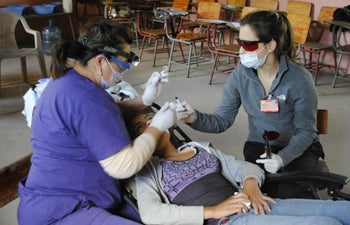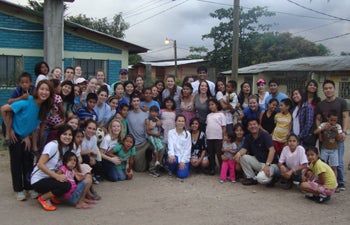Creating Smiles in Honduras
Imagine walking for days to a makeshift mobile medical clinic to receive free health care, then standing in line with more than 1,000 others for days, hoping to be treated.
Erin Walker, a USC Dornsife predentistry student, witnessed this firsthand in Honduras last winter when she volunteered with Global Medical Brigades, a student-led global health organization that provides mobile medical clinics in communities in Honduras, Ghana and Panama.
For Walker, the life-changing experience led her to form a dental brigades chapter at USC.
“It’s really amazing to see how thankful the people are and what an impact you can have,” said Walker, a senior majoring in neuroscience and human biology at USC Dornsife.
According to Walker, since Global Medical Brigades focuses mostly on health care but not as much on dental care, Walker came up with a solution. In Fall 2012, she founded USC Global Dental Brigades and began collaborating with students from the Virginia Tech Global Medical Brigades chapter to plan another trip to Honduras to establish a joint medical and dental clinic. In January, Walker and six other USC predental students boarded a plane to Tegucigalpa, Honduras.

USC Dornsife’s Erin Walker (right) assists a Global Medical Brigades-hired Honduran dentist while the dentist works on a local girl’s teeth. Photo courtesy of Erin Walker.
“Being in the trenches of dentistry is great, but I also think it’s all about the human connection and how significant that can be,” she said.
During the one-week trip, Walker and her team rose before dawn each day and drove for two hours on dirt roads to schools or churches, which they transformed into pharmacies, consultation rooms and operating rooms.
The dental clinic housed a row of classroom chairs lined up for patients needing extractions and a reclining lawn chair used for patients needing restorative work. Most of the work was performed illuminated by a handheld flashlight due to a lack of natural lighting.
Despite logistical challenges, the team completed 143 extractions and 71 fillings and, along with students from Virginia Tech, served 1,020 patients in four days. At the end of each day, students and their supervisors dismantled the clinic, packed up all of the supplies and commuted two hours back to their lodging.
Walker enlisted the help of dentist Elbert Tom, whose daughter, Rebecca, is USC’s dental brigades president. Tom said he wasn’t sure what to expect when he accompanied the students to Honduras, but is glad he went.
“Erin is absolutely wonderful. There are not enough nice things that I could say about her,” said Tom, who had a private practice in Van Nuys, Calif., and is an oral radiology and restorative dentistry instructor at UCLA. “She has a way of getting people to assist in causes. Erin was nice enough to explain what the expectations of me were and that took a lot of pressure off of my shoulders.”
Because she speaks fluent Spanish, Walker acted as office manager and patient coordinator at the makeshift dental clinic. She also enjoyed teaching children how to brush and floss properly and provided fluoride treatments.

The group of USC Global Dental Brigades huddles with dentists and dental patients in Honduras. Erin Walker is front, center. Photo courtesy of Erin Walker.
Walker is busy trying to expand the dental brigades club and planning another trip for this January, though she won’t likely go because she’ll be applying to dental school. The Oak Park, Calif., native has enjoyed participating in several honor societies at USC, being a USC Spirit Leader for two years and playing on the USC women’s club ice hockey team. She studied abroad in South Africa and Brazil, and will spend this summer at Oxford University doing a research project on HIV and AIDS. Her long-term goal is to work in general dentistry and continue serving those in need.
“No matter what I do, I definitely will always incorporate a component of service, whether it be in L.A., because there is definitely is a need here, or abroad,” Walker said. “I’ll find a way.”